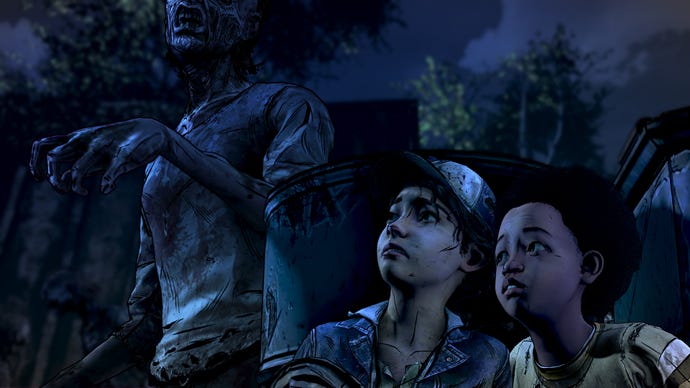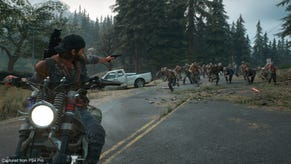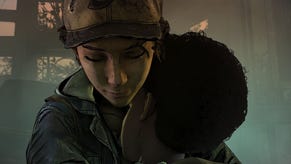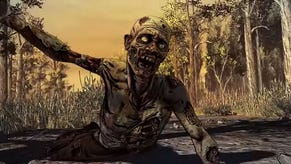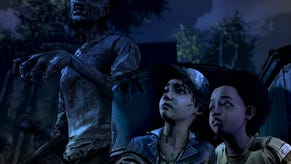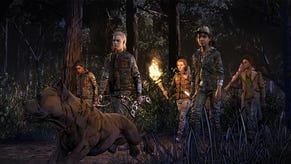How The Walking Dead: The Final Season's Creative Director Kept His Vision Alive During Telltale's Demise
Kent Mudle talks about how he kept his word machine in working order for The Final Season while his world crumbled.
This article first appeared on USgamer, a partner publication of VG247. Some content, such as this article, has been migrated to VG247 for posterity after USgamer's closure - but it has not been edited or further vetted by the VG247 team.
The rise and fall of Telltale Games is a particularly hard-hitting story in an industry that's not lacking for heart-wrenching news about abusive crunch policies and unfair layoffs. If Telltale was a wrecked fishing trawler, experienced sailors would gather around stoves on stormy nights to shake their heads and speak of the vessel's remains mournfully. "Och, aye, such potential. Such a young, talented crew. All sunk by an incompetent Captain."
Indeed, the sinking of Telltale evokes the special kind of pain that comes with watching an underdog stumble and die. The little studio gained accolades and relevance by developing high-quality adventure games—a genre that received little mainstream attention until Telltale's adaptation of the The Walking Dead franchise uplifted it. But Telltale's success gradually became its undoing as it acquired numerous other licenses. Telltale was soon spread thin, its employees expected to endure endless crunch in hopes of turning out another game as prestigious as The Walking Dead. While its games based on the popular Fables comic franchise (The Wolf Among Us) and Tales from the Borderlands received critical acclaim, it understandably became impossible for the Telltale team to release consistently excellent games on the management's insane schedule.
One point that makes Telltale's history especially gutting is how its last days showed signs of a studio on the mend. Former Zynga general manager Pete Hawley became its CEO, and internal restructuring reportedly put the studio back on course. Sadly, a potential (and vital) financial backer pulled out at the last minute, leaving Telltale without the necessary funds to keep operating. Nearly all its projects, including the final season of The Walking Dead, were canceled.
"The real tragedy of Telltale is it was turning around at the end," The Walking Dead: The Final Season's creative director Kent Mudle tells me during PAX East 2019 in Boston. "The bad air of Telltale is defined by overbearing management making everything sort of homogenized. There were several projects in development that were all about to be brand-new things that the creators really believed in. Telltale was good at the end. That's the most tragic thing."
Despite Telltale's demise, The Walking Dead wasn't about to let itself get buried that easily. It's not proper for a game about the resurrected undead to just fade gently in the good night. Shortly after the bad news about Telltale climaxed with its shutdown, Skybound, the multiplatform entertainment company founded by The Walking Dead creator Robert Kirkman, stepped in and resuscitated the last season of The Walking Dead. Skybound's development team even called back several ex-Telltale employees, including Mudle.
The Walking Dead's journey towards completion has been, in a word, tumultuous. While one studio crumbled around Mudle, another whisked him out of the rubble. Being a writer myself (my mom assures me I'm one, anyway), I don't even feel like writing when I have a stomach ache. I ask Mudle how he managed to stay focused on writing while enduring the enormous emotional stress of Telltale's end days.
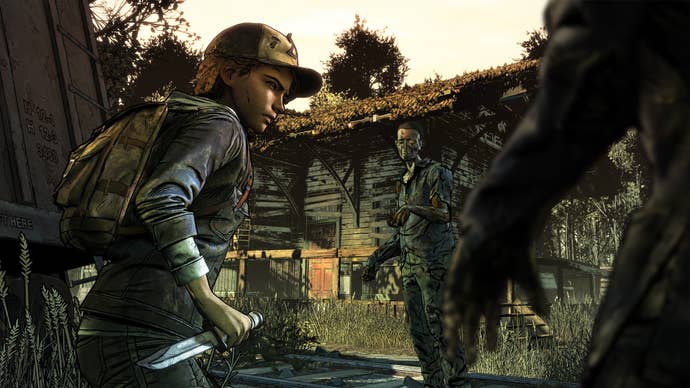
Mudle recalls he had a great "creative support network" that kept him sane. "I had a good team. I had a trio of people helping me along the way: Lead writer James Windeler, lead designer Mike Kirkbride, and seasoned writer Chris Roberts," Mudle says. "Just knowing that we could bounce ideas off each other and trust in each other's tastes most of the time almost felt like a safety net. Like, 'I will propose something, and if it is trash, they will tell me. They will not mince their words, and we're all honest with each other.'"
It helped that Mudle, Windeler, and Kirkbride were already creative comrades-in-arms thanks to their work on Batman: The Telltale Series. "The three of us had just rolled off [the second] Batman season. We had nailed that, in my opinion, very hard," Mudle says. "We were a well-oiled creative machine, and knowing I still had those guys to back me up with The Walking Dead generally made me feel pretty confident in the direction we were going in spite of Telltale exploding."
Something else that kept Mudle focused—and this is of note for writers everywhere—is that his team planned out The Final Season's major plot points and direction before Telltale hit its lowest point. "Thankfully we had made most of our serious plans before [the implosion] happened. So, when we had to get up and running again, we just had to execute on our plans and do normal revs along the way," Mudle says. "If Telltale's explosion had happened much earlier, it might've been much more devastating to the story. But since it sort of happened mid-late, we already knew what we were going to do. The struggle was just getting back to work to finish our existing plan."
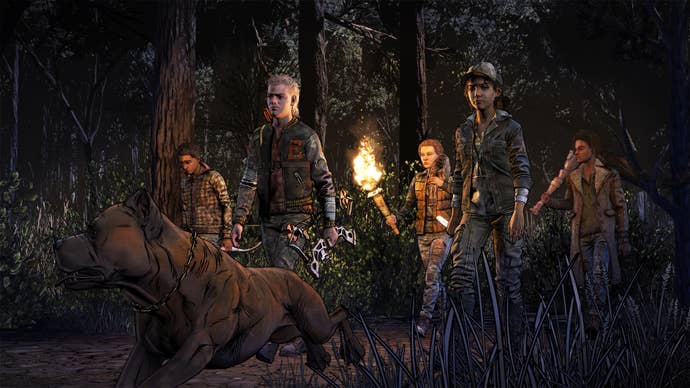
The Final Season's Skybound rescue was extremely fortuitous not just for fans, but for the Telltale team working on the project. The loss of employment is agonizing by itself, but there's a special spiritual pain that comes with watching a beloved creative project rust by the curbside, never to see completion. I ask Mudle how he felt when he learned Skybound would grant The Walking Dead a chance at closure.
"Immensely relieved and now that it's over, immensely satisfied," he laughs. "It was honestly the coolest project I got to work on at Telltale. It was heartbreaking that, in addition to losing my job, I thought we weren't going to get artistic closure on this thing we all believed in."
Unsurprisingly, Telltale's last minute (and ultimately fruitless) turn-around made The Final Season's seeming death that much more devastating. "I was in the 'malaise period' of Telltale, and to finally be making an objectively good [game] again—it would have been heartbreaking if we'd not been able to finish it," Mudle says. "But because we did, I'm immensely satisfied in the resolution."
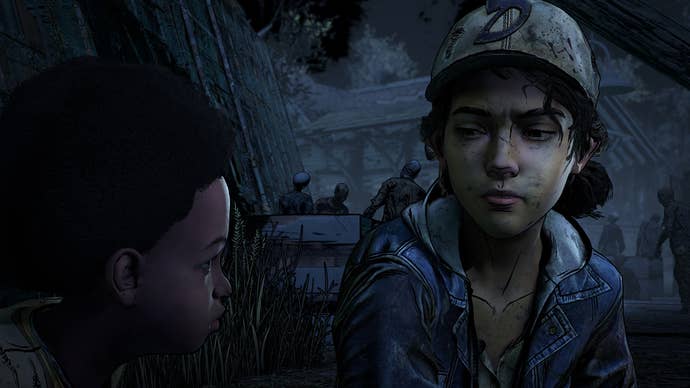
Telltale's apocalypse thankfully didn't snuff out all the creative lights burning in The Final Season's writers. When I ask Mudle if Telltale's upper staff tried to micromanage the story's direction, he said it didn't happen.
"I will say this to the credit of Skybound and late era Telltale management: They trusted our team to make it right. Their only requirements were that it brought an end to Clementine's story, and that people would cry. As long as we checked those two boxes, they didn't care how we did it.
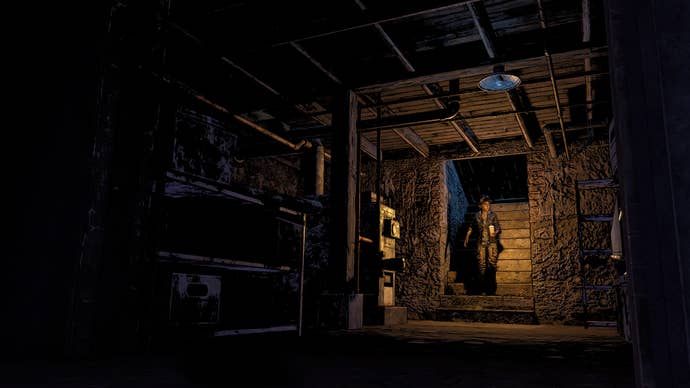
It took the long way around, but Telltale's The Walking Dead has finally been tucked in for its deserved dirt nap. We've said goodbye to its characters (and indeed, we cried), and wished them luck. I ask Mudle what comes next. He says he wants to stay in game development, and while he wants to keep on telling stories, he also hopes his next game "will have a jump button in it."
"I really like action. If I make another game, I'd like a little action in it. I'm happy we got a little bit of a fighting system into The Final Season. I do really like action mechanics. So, if I could make something that has action mechanics and storytelling, I'd be pretty happy."
Maybe this means Kent Mudle will deliver the next Katana Zero. You won't catch me complaining.
